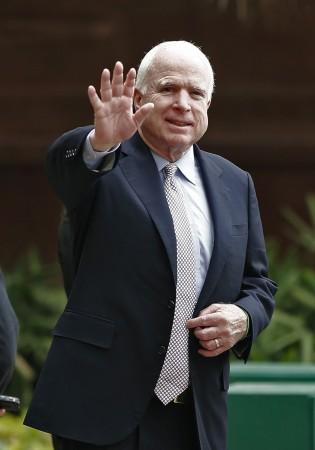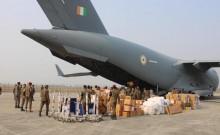
US Senator John McCain visited India on a day when Indo-US relations hit another low after the Khobragade case, with documents revealing that the US' National Security Agency (NSA) spied on the Indian government as well the ruling Bharatiya Janata Party.
McCain himself termed the snooping row as "embarrassing", in an interview with CNN IBN. He also admitted the need for the US Congress to supervise surveillance programs.
"It is very embarrassing because we are friends but we know that these things go on, but it seems to me now that the BJP is in power, we do not have to do that anymore, we are friends now and we can speak openly and honestly with each other," McCain said.
He also took some blame for the "overstepping". "I do know that all kinds of information gathering goes on and whether that goes too far or not, in my view is something that the Congress is supposed to have oversight of. So I will take the responsibility of some of these, overstepping, I would say actions that have angered our friends," he told the news channel.
While the revelations came on Monday, when whistle-blower Edward Snowden's documents were published in The Washington Post, India summoned the US diplomat in New Delhi over the matter on Wednesday, the day when McCain met External Affairs Minister Sushma Swaraj.
Despite the row hanging overhead like a dark cloud, McCain pressed for better bilateral ties between India and the US, and even furthered his aim to invite Prime Minister Narendra Modi to address the joint-session of the US Congress when he visits the country in September. Praising Modi, McCain said, "We have very high expectations as I think the people of India do, this is a very decisive election, we have a very strong leader and we think this is a very opportune time for renewal and re-invigoration of relations between US and India".
McCain will meet with Modi on Thursday, a day after his meeting with Swaraj, where the two are reported to have discussed ways to take bilateral relations forward and also about the situation in Afghanistan and Iraq.
While India-US relations had hit a historic row over the apprehension of Indian diplomat Devyani Khobragade last December, the recent reports of NSA being given the authority to spy on BJP and the Indian government caused an uproar in the government, with the Ministry of External Affairs calling the foreign surveillance "an invasion of privacy" and "unacceptable".
As per documents released by Snowden, a US court in 2010 had authorized NSA surveillance of six foreign political parties such as Egypt's Muslim Brotherhood, Lebanon's Amal, the Pakistan People's Party, Egyptian National Salvation Front and the Bolivarian Continental Coordinator of Venezuela, apart from India's Bharatiya Janata Party.
McCain laid the groundwork for other top US officials expected to visit India soon. US Secretary of State John Kerry as well as US Deputy Secretary of State William Burns are set to visit later this month. The US officials are also expected to bring up military deals as India is set to open up its defence sector to foreign investors, with reports suggesting that the government will allow 49 percent FDI.
McCain himself represents the Arizona constituency in the Congress, which is said to house several big military businesses.

















